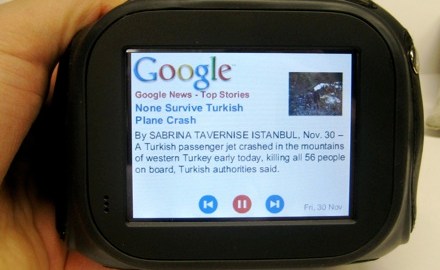The News Is Dead, Long Live the News!

“Newspapers never made money on ‘news.’ Serious reporting, say from Afghanistan, has simply never paid its way. What paid for newspapers were the automotive sections, real-estate, home-and-garden, travel, or technology, where advertisers could target their ads.” That’s what Google’s chief economist, Hal Varian, told James Fallows in an interview for a great recent piece Fallows did on the future of news. But, as I wrote in my last post, that old model won’t work any more. As Fallows says, because the Internet—and Google in particular—lets users find the one article they wanted to read or the one product they wanted to buy, it is in effect “one giant system for stripping away such cross-subsidies.” Now that we can get whatever we’re looking for online a la carte, the news is going to have to start paying its own way.
Good reporting is certainly worth paying for—it’s not like people aren’t interested in the news any more. The question is simply how to get people to pay for good reporting. Newspapers make relatively little advertising revenue from content they put online. Some are putting their articles behind a “paywall,” requiring users to pay a subscription fee to access certain kinds of content or read more than a few articles. But this probably will work only for papers like The New York Times that have a loyal readership and that can offer content not readily available elsewhere. In fact, in the long run, it’s probably only papers like The New York Times that can produce the careful, in-depth reporting and analysis not available elsewhere that will make any real money. There’s no money in every newspaper writing up the same news story or republishing the same wire service story on its website. Newspapers are no longer near-monopolies in their local markets, but have to compete both with other papers around the world and with the amateur writers and photographers who report local events or provide restaurant reviews for free. Nevertheless, news publishers that can produce well-researched or especially insightful pieces—or that can fund the proverbial “Bureau in Baghdad”—will continue to have something of value to sell.
As Eric Schmidt, Google’s CEO, told Fallows, “Newspapers don’t have a demand problem; they have a business-model problem.” No one knows just exactly what their new business model should be. Business models, like products, have to be beta tested to see what works. But there is in principle no reason why people can’t make money off the news. And Google may be able to help. As I argued in an earlier post, the same thing that makes Google such a threat to the traditional newspaper business model—that it allows people to navigate directly to content that interests them—makes Google uniquely positioned to drive traffic to news sites and help them to make money of it. And Google knows it’s in its long term interest to do just that. After all, part of its business depends on people having news to search for. Google News already does a remarkable job of identifying important new stories and fresh perspectives. With the new Fast Flip—which apparently drives a lot of traffic to Big Think—Google is trying to make the news more accessible and easier to read. By directing users the best content, Google can help ensure that the sites that produce the best journalism get the most traffic. And while it is harder to target ads to readers of general interest news stories than it is to people who search for “blood pressure medication” or “marketing jobs,” Google—along with social media websites like Facebook—can help with that too, by helping content producers target ads at individual readers.
The transition won’t be easy for newspapers. Among other things, there probably isn’t room for as many reporters and editors as there used to be. Many papers will go under and many journalists will have to look for new jobs. Newspapers themselves will have to concentrate on what they can do that others can’t, which is to provide in-depth reporting. And they will mostly have to shed the print side of their business once and for all. The good news is that they can stand to save lots of money in the process. As Varian points out, right now, newspapers spend around 15% of their revenue on the people who actually report, edit, and analyze the news. If you include administrative and back office costs, that figure is probably still less than 35%. So while the move to online publishing will be painful, in the long run they should be able to produce the news much more cheaply. And, most importantly, start to get paid for it again.





